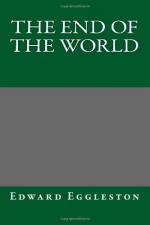I am aware that I have so far let the reader hear not one word of Samuel Anderson’s conversation. He has played a rather insignificant part in the story. Nothing could be more comme il faut. Insignificance was his characteristic. It was not so much that he was small. It is not so bad a thing to be a little man. But to be little and insignificant also is bad. There is only one thing worse, which is to be big and insignificant. If one is little and insignificant, one may be overlooked, insignificance and all. But if one is big and insignificant, it is to be an obtrusive cipher, a great lubber, not easily kept out of sight.
Appealed to by his wife, Samuel Anderson prepared to assert his authority as the head of the family. He almost strutted into Julia’s presence. Julia had a real affection for her father, and nothing mortified her more than to see him acting as a puppet, moved by her mother, and yet vain enough to believe himself independent and supreme. She would have yielded almost any other point to have saved herself the mortification of seeing her father act the fool; but now she had determined that she would die and let everybody else die rather than walk with a man whose nature seemed to her corrupt, and whose touch was pollution. I do not mean that she was able to make a distinct inventory of her reasons for disliking him, or to analyze her feelings. She could not have told just why she had so deep and utter a repugnance to walking a quarter of a mile to the school-house in company with this man. She followed that strong instinct of truth and purity which is the surest guide.
“Julia, my daughter,” said Samuel Anderson, “really you must yield to me as head of the house, and treat this gentleman politely. I thought you respected him, or loved him, and he told me that you had given consent to marry him, and had told him to ask my consent.”
In saying this, the “head of the house” was seesawing himself backward and forward in his squeaky boots, speaking in a pompous manner, and with an effort to swell an effeminate voice to a bass key, resulting in something between a croak and a squeal. Julia sat down and cried in mortification and disgust. Mr. Anderson understood this to be acquiescence, and turned and went into the next room.
[Illustration: JULIA SAT DOWN IN MORTIFICATION.]
“Mr. Humphreys, my daughter will be glad to ask your pardon. She is over her little pet; lovers always have pets. Even my wife and I have had our disagreements in our time. Julia will be glad to see you in the sitting-room.”
Humphreys drew the draw-strings and set his face into its broadest and most parallelogrammatic smile, bowed to Mr. Anderson, and stepped into the hall. But when he reached the sitting-room door he wished he had staid away. Julia had heard his tread, and was standing again with her foot advanced. Her eyes were very black, and were drawn to a sharp focus. She had some of her mother’s fire, though happily none of her mother’s meanness. It is hard to say whether she spoke or hissed.




